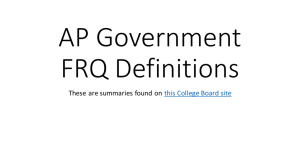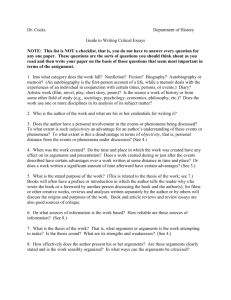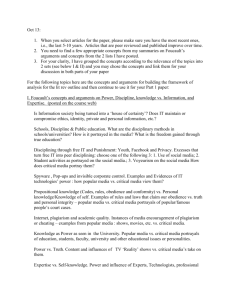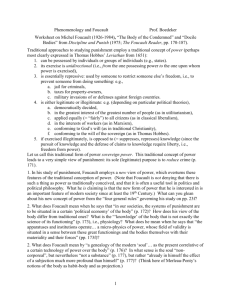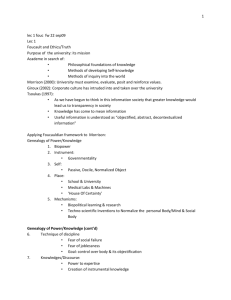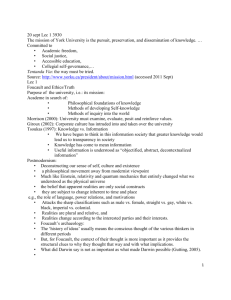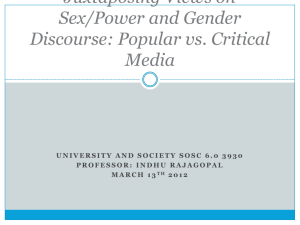lec 5 nov 1 How to write a good Litt Review for a good essay P 1
advertisement
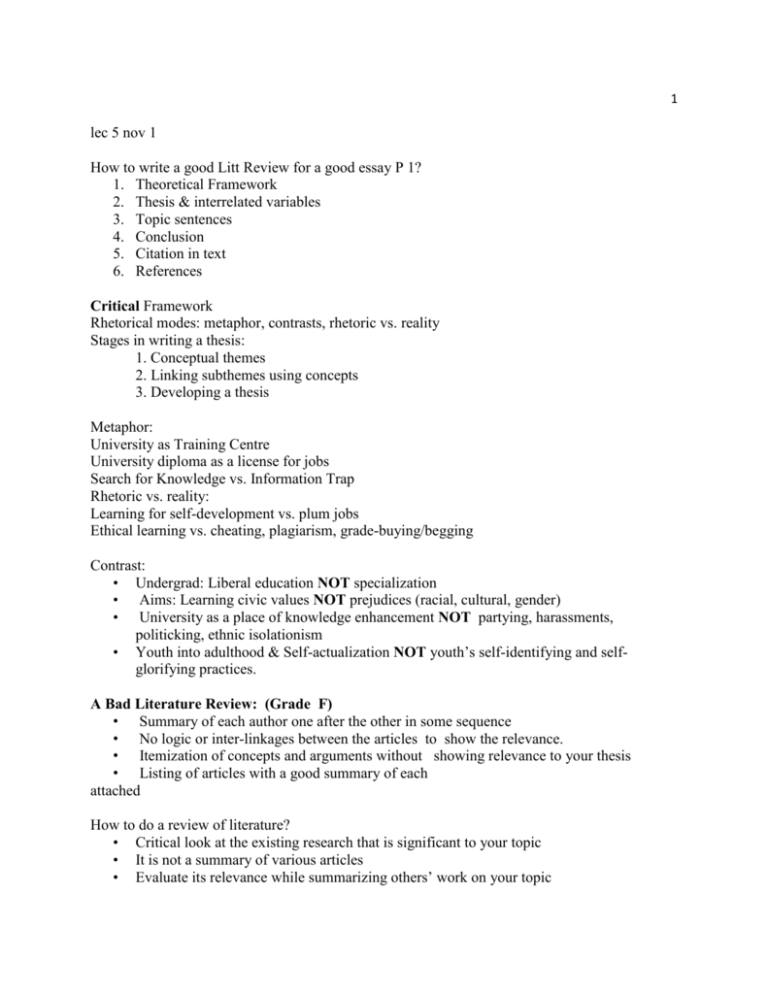
1 lec 5 nov 1 How to write a good Litt Review for a good essay P 1? 1. Theoretical Framework 2. Thesis & interrelated variables 3. Topic sentences 4. Conclusion 5. Citation in text 6. References Critical Framework Rhetorical modes: metaphor, contrasts, rhetoric vs. reality Stages in writing a thesis: 1. Conceptual themes 2. Linking subthemes using concepts 3. Developing a thesis Metaphor: University as Training Centre University diploma as a license for jobs Search for Knowledge vs. Information Trap Rhetoric vs. reality: Learning for self-development vs. plum jobs Ethical learning vs. cheating, plagiarism, grade-buying/begging Contrast: • Undergrad: Liberal education NOT specialization • Aims: Learning civic values NOT prejudices (racial, cultural, gender) • University as a place of knowledge enhancement NOT partying, harassments, politicking, ethnic isolationism • Youth into adulthood & Self-actualization NOT youth’s self-identifying and selfglorifying practices. A Bad Literature Review: (Grade F) • Summary of each author one after the other in some sequence • No logic or inter-linkages between the articles to show the relevance. • Itemization of concepts and arguments without showing relevance to your thesis • Listing of articles with a good summary of each attached How to do a review of literature? • Critical look at the existing research that is significant to your topic • It is not a summary of various articles • Evaluate its relevance while summarizing others’ work on your topic 2 • • Show the relationships between different works by showing how it relates to your work It is not a summary or concise description of others’ work. • • • Select your topic subthemes Show how they relate to other’s work What are the interrelated factors (or variables) that other authors have used in their studies on the topic Show how these variables relate to your work • • The literature review should provide the context for your research by looking at what work has already been done on your topic A common error is to write descriptively rather than analytically. In Social Science: your should choose: • Theories taught in class (Foucault’s) • Concepts or variables to build a thesis and framework • Different writers’ arguments for and against your position • Grouping of different writers arguments under concepts/themes Look at literature reviews by authors of your kit articles as examples Various authors’ arguments: • • Finding his/her arguments Finding interrelated factors (or variables) in the articles What are variables? Any higher education or students’ issues: e.g., university, power/knowledge, information, antiintellectualism, cheating, body, consumerism, plagiarism, curriculum, corporatization, Web tools (spyware, Facebook, Twitter), social media, docile bodies of students re.: gender/class/race, etc. Analysis focus: Why and how are the above influenced or influence outcomes on Body or of true knowledge? Your topics: • Are consumers Prisoners - students are treated as consumers of information rather than as pursuers of intellectual development? • Gender and preference of arts or sciences? • Web objectification and control: Facebook – privacy – confessions • ‘Docile body or Commodification of the Body’ or “Docility through body modifications." Are these a result of media or other societal influences? • Plagiarists use their power (of appropriation) and control over other’s work vs. the development of self efficacy and ethics in the pursuit of true knowledge. 3 Topics (cont’d) • Inscribing the Body: Popular cultural power of media, body identity & selftransformations, e.g., surgical modifications, tattooing, etc., in order to ‘normalize’ the body • Analyzing the social meaning of the body , e.g., tattooed narratives on the skin: does it socially objectify or liberate the body? • Disciplining the body – child, teen, youth – to become docile. How does media, Facebook & confessions turn the body docile? Seale, C (2006): Commodification of Body Parts… (Foucault) Apart from the medical professionals and hospitals, as an independent source of power, the mass media objectifies, commercializes and spectaclizes the news about human materials as a form of entertainment for sale. Martin, E. (1993). Histories of Immune Systems, Culture, Medicine and Psychiatry 17: 67-76. (Foucault) Power conduits are microcontrols that inspect, objectify and examine the body in a multitude of contexts: prisons, hospitals, schools, the military, the factory. The gaze of prison guards produce docile bodies. Similarly, a patient willingly turns into a docile body through the disciplinary gaze and questions medical and health experts - the therapist, doctor, sociologist, or demographer – address to her/him. ( let me know if you need this article). Turner (2006): Hospitals and Expert medical knowledge: Contradictions present in medical knowledge and governmentality : • Ethics of curing illnesses vs. profit from maintaining life-long illnesses • Corporate monopolistic control of pharmaceutical industries vs. remedies through ethical methods and effective cures • Medical specialization vs. general medicine • Global free market in body parts vs. ethical medicine. Consumers as ‘Prisoners’ (Foucault) Consumers of what? Students as trainees for the job market, Internet users for buying or selling wares, beauty product buyers, Body modifiers through cosmetic surgery or Extreme make-over on TV. Power represses and disciplines. How? Disciplinary society’s means of control of individuals: • Surveillance • Normalization • Objectification through: • Confession • Governmentality 4 • Expert knowledge Dimitriadis, G. (2006) 'On the Production of Expert Knowledge: Revisiting Edward Said's work on the intellectual', Discourse: Studies in the Cultural Politics of Education, 27:3, 369 – 382. Production of intellectuals and Expert knowledges Foucault: • The ‘‘official’’ notion of scholarly idea is cut off from the plurality of realities (E. M. Said) • Production of ‘‘expertise: dangers of ‘‘professional expertise.’’ - ‘‘expert’’ implies narrow notions of control and competence - fewer people able to speak from privileged positions • ‘Speak truth to power’ : addresses multiple audiences • Knowledges are treated as commodities, independent of those who produce them. • Professional, Amateur, Reflective activist • academia is perhaps the ‘‘last utopia’’ (let me know if you need this article) Example topic: Students are produced. Why & How? Thesis (Marxist): Increasingly higher education is being relegated from the status of being a public good, being privatized as a commodity, and regarded as a part of the production process in industrial societies. To obtain such an education, students pay continually increasing fees. The curricular content is geared to passive training rather than to think and reflect critically. Students must acquire degrees for fear of failure in the job market where, as workers, they are commodified. Some arguments: 1. The neoliberal state has reduced the public funding to high education 2. State has encouraged privatization of the university 3. Branding of universities Corporate funding & control (Marxist (cont’d) 1. Corporate funding & corp. culture in higher education: (Giroux, 2002) • Corporate and State control over the civil society • Manipulated research vs. ethical research • Applied/ Vocational learning vs. critical thinking and intellectualism 2. Corporate concentration of power (Winter (2002) Media Monopoly) • Corporate Surveillance and reinforcement of obedience • Corporate Punishment (of firing for jobs) Read with a purpose: 5 • • • • Summarize the work you read but you must also decide which ideas or information are important to your research (so you can emphasize them) Which are less important and can be covered briefly or left out of your review. Look for the major concepts, conclusions, theories, arguments etc. that underlie the work Look for similarities and differences with closely related work. Write with a purpose: your aim should be to evaluate and show relationships between the work already done and how you will use Foucault’s concepts to analyze them. • Is Researcher Y's arguments more convincing than Researcher X's? • Did Researcher X build on the work of Researcher Y? • What is your position between this work and your own. • To do this effectively you should carefully plan how you are going to organize your work
